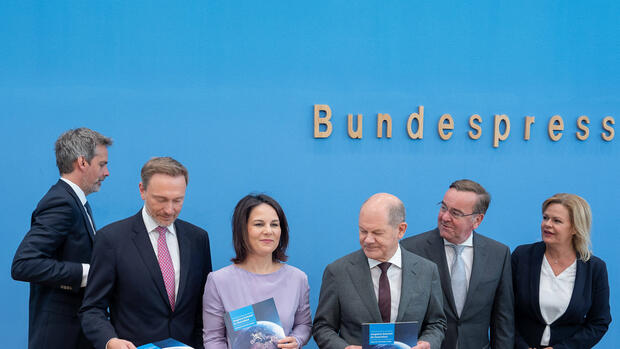Berlin A dispute is brewing in the traffic light coalition over the new national security strategy. The FDP does not want to accept the decision that no separate National Security Council should be introduced as part of the strategy.
The SPD and the Greens clearly rejected the FDP’s initiative. For months, the question of whether there was a need for a National Security Council had been debated within the federal government, said Konstantin von Notz, Vice President of the Greens. “Ultimately, the joint decision was made that existing structures are sufficient to achieve the formulated goals.”
The SPD digital politician Jens Zimmermann also sees no need to form a special security committee as a control center in the government. The adoption of the first national security strategy represents “important progress” in security and foreign policy, Zimmermann told the Handelsblatt. Thus, in the future, all ministries in these areas will follow a common strategy. “There is definitely great added value here. I think the focus on another body is a wrong prioritization,” says Zimmermann.
The Chair of the Defense Committee of the Bundestag, Marie-Agnes Strack-Zimmermann (FDP), however, called it disappointing that the Chancellery and the Foreign Ministry did not want to set up a National Security Council. “We Free Democrats will now work hard to ensure that such an urgently needed security council is included in the national security strategy,” she told the dpa news agency.
Chancellor Olaf Scholz (SPD) and Foreign Minister Annalena Baerbock (Greens) have defended the decision not to introduce a separate National Security Council as part of the national security strategy, as requested by the FDP. After Russia’s attack on Ukraine in February 2022, the federal government met in the security cabinet, said Baerbock on Wednesday in Berlin at the presentation of the basic document adopted by the cabinet. It has been shown that you can come together and make decisions in a spirit of trust in critical moments. This will also be continued in the future.
Top German diplomat criticizes the lack of a security council
Scholz said that after consideration, “a greater added value was not recognized”. There is the Federal Security Council, which makes the relevant decisions. Strategic decisions to support Ukraine in its defense against the Russian attack have also been made. In the meantime, the question of what the difference would be if you create another body institutionally “found less and less important”.
Federal cabinet adopts first national security strategy for Germany
However, experts such as the former head of the Munich Security Conference, Wolfgang Ischinger, attach great importance to a security council within the government. “My concern is that the implementation of any strategy in a three-party coalition is very complex from the outset,” said Ischinger. “If then, as is the case here, there is a lack of instruments for forward-looking, systematic and coordinated implementation, the result will remain unsatisfactory because every ministry will insist on the departmental principle.” Therefore, a “Chief Risk Officer of the federal government” would be needed.
>> Read also: Sharp tones towards China – the federal government decides on a national security strategy for the first time
Above all, the Americans had high hopes for a German Security Council and had already wished for such a body from the previous government of the traffic light coalition under then Chancellor Angela Merkel (CDU). In the meantime, the Union is clearly in favor of a National Security Council that coordinates foreign and security policy decisions and takes over operational control in crisis situations.
The security strategy is also on the agenda of the Bundestag this Thursday. After almost 70 minutes of debate, the 74-page paper is to be sent to the Foreign Affairs Committee in charge for further consultation.
The Green politician von Notz explained with a view to a Security Council: “From today’s perspective, we assume that there will be no further very fundamental changes of an institutional nature in the further parliamentary process.” Because in view of the sharply increased threat situation, the common concern must be be to increase Germany’s security “effectively as quickly as possible”.
According to the strategy, all relevant policy areas and actors should be involved in order to make Germany resilient. This ranges from national and alliance defense to the protection of technical infrastructure, cyber and space security to raw material, energy and food security.
Civil defense and civil protection, development policy, protection from outside influence and espionage, and dealing with the climate crisis and pandemics are also mentioned. The federal, state and local governments, business, science, civil society and the general public are to be involved.
More: Interview with tech expert Wang – “The EU doesn’t have the brutal, bloodthirsty mentality that China and the US have”
